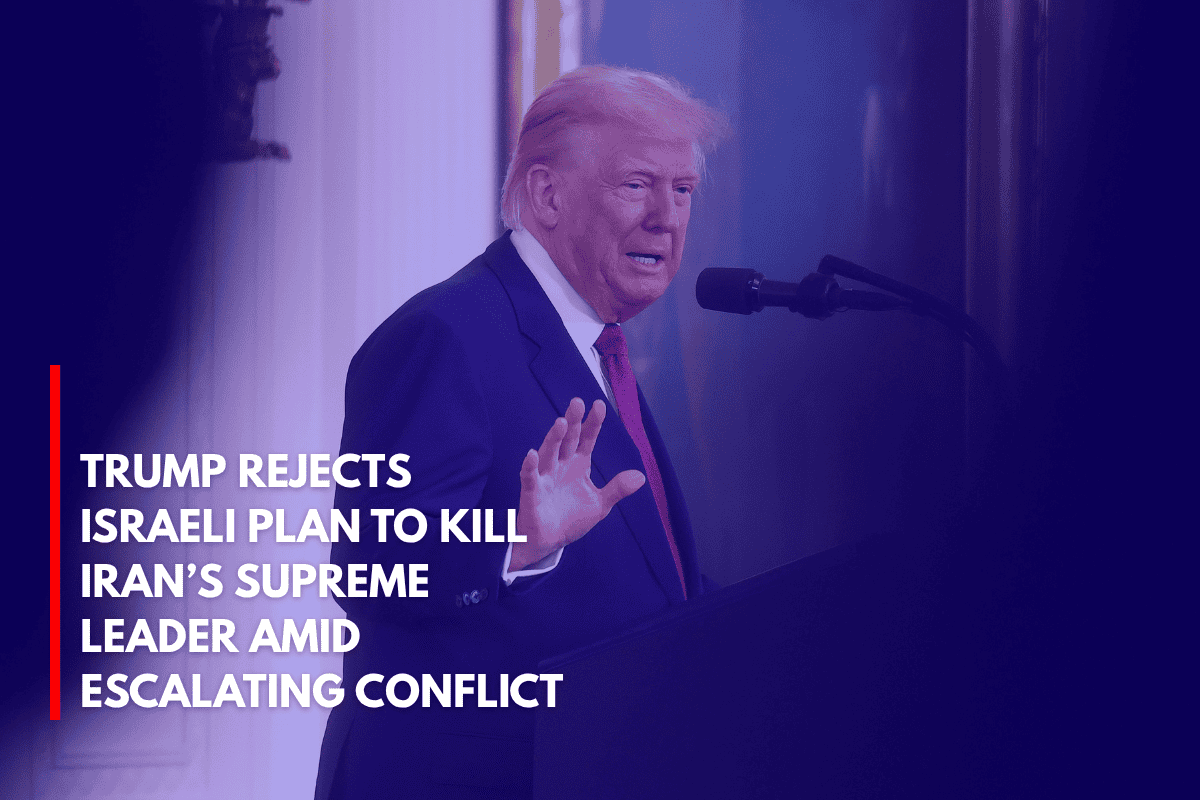Amid rising tensions between Israel and Iran, President Donald Trump opposed an Israeli plan to kill Iran’s Supreme Leader, Ayatollah Ali Khamenei, according to multiple sources.
The proposal, reportedly discussed by Israeli officials, was scrapped after the U.S. made it clear that Trump did not support such an extreme measure, preferring to avoid further escalation in the Middle East.
Over the weekend, one senior U.S. official told CNN that Israel had the opportunity to target Khamenei, but after Trump’s intervention, the plan was not executed.
Trump has consistently shown a preference for keeping the United States out of direct military involvement, especially in Middle Eastern conflicts, a stance that contrasts with calls from some of his Republican allies for a more interventionist approach.
The Escalating Israel-Iran Conflict
The conflict between Israel and Iran has intensified in recent days, with ongoing tit-for-tat strikes between the two nations. Over the weekend, Israeli Prime Minister Benjamin Netanyahu was asked about reports of the assassination plan, which he dismissed as “false.” His spokesperson labeled the reports of Trump’s rejection as “FAKE.”
Despite the escalating violence, the Trump administration continues to signal an openness to diplomatic efforts with Iran.
While Israel has carried out military operations, including attacks on Iranian facilities, Trump has refrained from joining in these efforts, even though some within the administration see U.S. military support as potentially speeding up Israel’s goals.
Trump’s Stance on U.S. Involvement
In a Sunday interview with ABC News, Trump reiterated that the U.S. is currently not involved in the conflict, though he did leave open the possibility of future involvement.
He stated, “It’s possible we could get involved. But we are not at this moment involved.” This reflects his cautious approach to avoid getting caught up in another prolonged Middle East war.
Since Israel’s initial strike on Iran on Friday, the U.S. has provided defensive support, helping intercept Iranian retaliatory missiles.
However, Trump has repeatedly resisted calls from Republicans, including Sen. Lindsey Graham, to take a more active role. Graham, on X (formerly Twitter), argued that supporting Israel could reinforce America’s credibility and strength globally.
Trump has been clear in his desire to avoid the mistakes of past U.S. interventions in the region. Speaking to West Point cadets last month, he vowed not to engage in “nation-building” and to prevent the U.S. from becoming entangled in wars with little strategic benefit. His reluctance to escalate military involvement reflects this long-standing stance.
The Path to Peace: Trump’s Hopes for Negotiations
Despite the rapidly deteriorating situation, Trump continues to express hope that a peaceful resolution can be achieved.
On Truth Social, Trump wrote that he believes a deal between Iran and Israel could end the conflict: “We can easily get a deal done between Iran and Israel, and end this bloody conflict!!!” This comment highlights his preference for negotiations, even as military actions unfold.
The U.S. had been in talks with Iran over its nuclear program, but those efforts have stalled. Scheduled discussions between the U.S. and Iranian negotiating teams were called off just before the weekend.
Trump’s position is complicated by both domestic political pressure and the international stakes. While he is committed to reducing U.S. military involvement, there are growing concerns about the broader implications of Israel’s actions, including potential instability in the region.
His administration has made it clear that while the U.S. is not directly involved, it will continue to monitor the situation closely.
Israel’s Operation Against Iran
While Trump’s administration has refrained from endorsing Israeli strikes on Iran’s nuclear facilities, Israel is pushing forward with its military operation.
Israeli officials expect the operation to take weeks, not days, and they have emphasized that their primary goal is to prevent Iran from becoming an existential threat through its nuclear and ballistic missile programs.
However, Israel has made it clear that it will pursue its objectives independently if necessary. “If it’s done in conjunction with allies, fine, but if it’s not done in conjunction with allies, we have to do it ourselves,” an Israeli official said.
The Future of U.S.-Israel Relations
The administration remains deeply divided over how much the U.S. should engage in the conflict. There is significant skepticism within the White House about further military involvement, with some officials wary of entering another prolonged conflict in the Middle East.
Meanwhile, others see an opportunity to reaffirm America’s position as a key ally of Israel, especially at a time of rising tensions in the region.
For now, President Trump’s preference remains to keep the U.S. out of the direct fighting, focusing instead on diplomatic efforts to de-escalate the situation, while responding to any attacks on American assets with overwhelming force.
However, the situation remains fluid, and the potential for greater U.S. involvement continues to loom large as the conflict progresses.











Leave a Reply